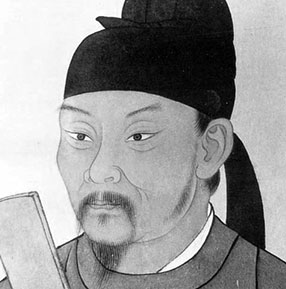The Excursion
translated from the Chinese by Florence Wheelock Ayscough
A number of young gentlemen of rank, accompanied by singing-girls, go out to enjoy the cool of evening. They encounter a shower of rain.
I
How delightful, at sunset, to loosen the boat!
A light wind is slow to raise waves.
Deep in the bamboo grove, the guests linger;
The lotus-flowers are pure and bright in the cool evening air.
The young nobles stir the ice-water;
The Beautiful Ones wash the lotus-roots, whose fibres are like silk threads.
A layer of clouds above our heads is black.
It will certainly rain, which impels me to write this poem.
II
The rain comes, soaking the mats upon which we are sitting.
A hurrying wind strikes the bow of the boat.
The rose-red rouge of the ladies from Yüeh is wet;
The Yen beauties are anxious about their kingfisher-eyebrows.
We throw out a rope and draw in to the sloping bank. We tie the boat to the willow-trees.
We roll up the curtains and watch the floating wave-flowers.
Our return is different from our setting out. The wind whistles and blows in great gusts.
By the time we reach the shore, it seems as though the Fifth Month were Autumn.
This poem is in the public domain. Published in Poem-a-Day on May 19, 2024, by the Academy of American Poets.
“The Excursion” appears in Fir-Flower Tablets (Houghton Mifflin Co., 1921). This anthology is composed of poems translated by Florence Wheelock Ayscough and the English versions were edited by Amy Lowell. In her introduction, Ayscough compares the poetics of Li Bai, also known as Li T’ai-po, and Tu Fu, noting, “Tu Fu was renowned for his careful versification; Li T’ai-po, on the other hand, not infrequently rebelled and made his own rules. […] We may put it that Li T’ai-po was the people’s poet, and Tu Fu the poet of scholars.” Ayscough goes on to report, “Innumerable essays have been written comparing the styles of Li T’ai-po and Tu Fu. Yuan Chen, a poet of the T’ang period, says that Tu Fu’s poems have perfect balance; that, if he wrote a thousand lines, the last would have as much vigour [sic] as the first and that no one can equal him in this, his poems make a ‘perfect circle.’ He goes on: ‘In my opinion, the great living wave of poetry and song in which Li T’ai-po excelled is surpassed in Tu Fu’s work, he is shoulder higher than Li Po.’ [Essayist, Confucian scholar, poet, and government official during the T’ang dynasty] Han Yu, speaking of both Li T’ai-po and Tu Fu, declares that ‘the flaming light of their essays would rise ten thousand feet.’ Poetic as these criticisms are, it is their penetration which is so astonishing; but I think the most striking comparison made of Tu Fu’s work is that by Tao Kai-yu: ‘Tu Fu’s poems are like pictures, like the branches of trees reflected in water—the branches of still trees. Like a large group of houses seen through clouds or mist, they appear and disappear.’”

